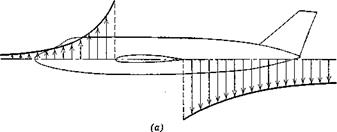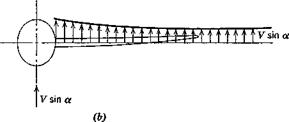PITCHING MOMENT OF A BODY AND NACELLES
The influence of the body and nacelles are complex. A body alone in an airstream is subjected to aerodynamic forces. These, like those on the wing, may be represented over moderate ranges of angle of attack by lift and drag forces at an aerodynamic center, and a pitching couple. When the wing and body are put together, however, a simple superposition of the aerodynamic forces which act upon them separately does not give a correct result. Strong interference effects are usually present, the flow field of the wing affecting the forces on the body, and vice versa.
These interference flow fields are illustrated for subsonic flow in Fig. 6.9. Part (a) shows the pattern of induced velocity along the body that is caused by the wing vortex system. This induced flow produces a positive moment that increases with wing lift or a. Hence a positive (destabilizing) contribution to Gm results. Part (6) shows an effect of the body on the wing. When the body axis is at angle a to the stream, there is a cross-flow component V sin a. The body distorts this flow locally, leading to cross-flow
|
|
|
Fig. 6.9 Example of mutual interference flow fields of wing and body—subsonic flow. (a) Qualitative pattern of upwash and downwash induced along the body axis by the wing vorticity. (6) Qualitative pattern of upwash induced along wing by the cross-flow past the body. |
components that can be of order 2 V sin a at the body-wing intersection. There is a resulting change in the wing lift distribution.
The result of adding a body and nacelles to a wing may usually be interpreted as a shift (forward) of the mean aerodynamic center, an increase in the lift-curve slope, and a negative increment in Cma . The equation that corresponds to (6.3,3) for a wing-body-nacelle combination is then of the same form, but with different values of the parameters. The subscript wb is used to denote these values.
G^ = omM, wb + cLJh-KJ (6.3Д)













